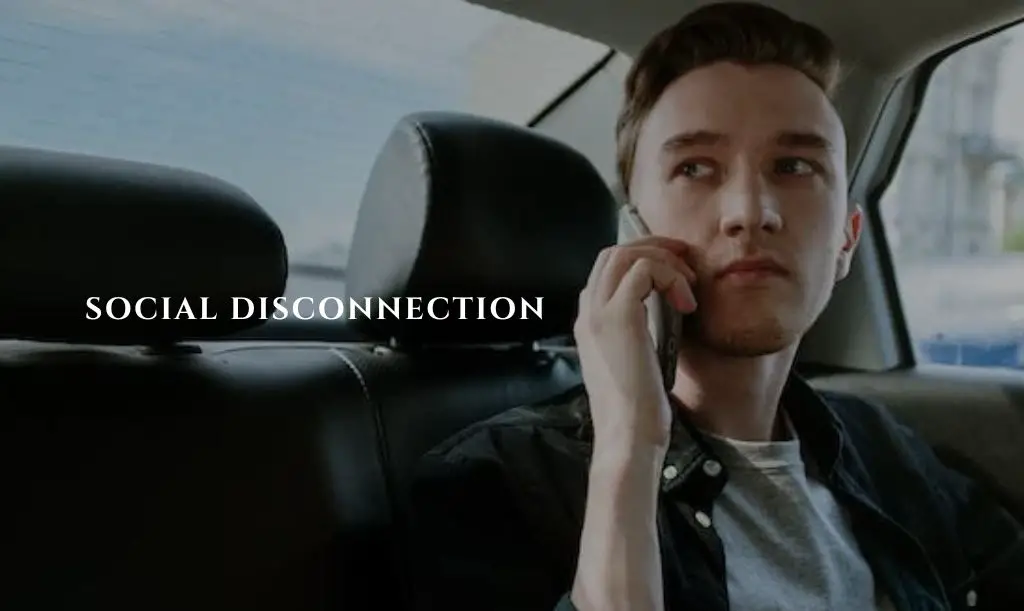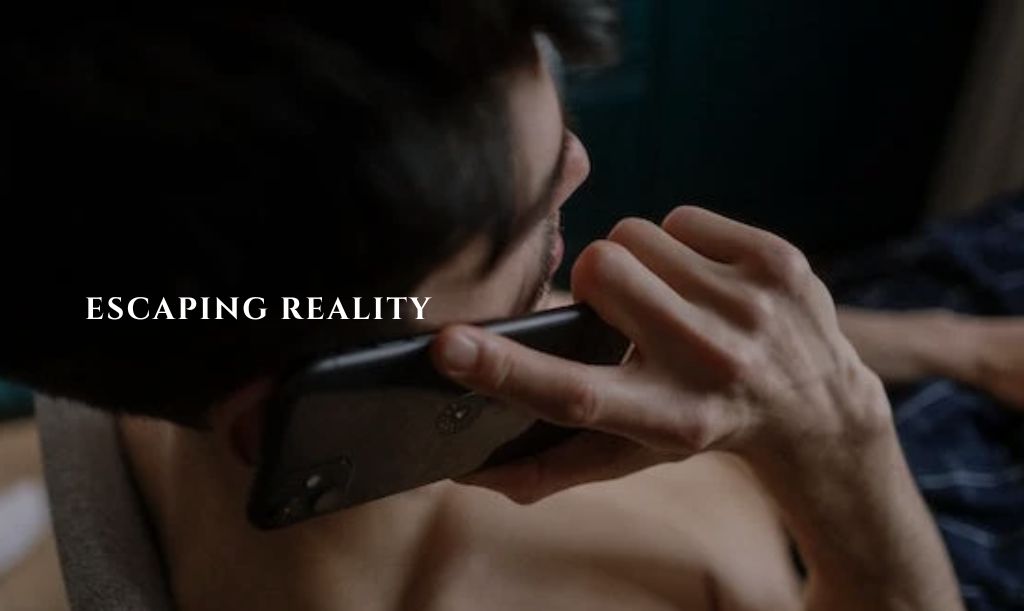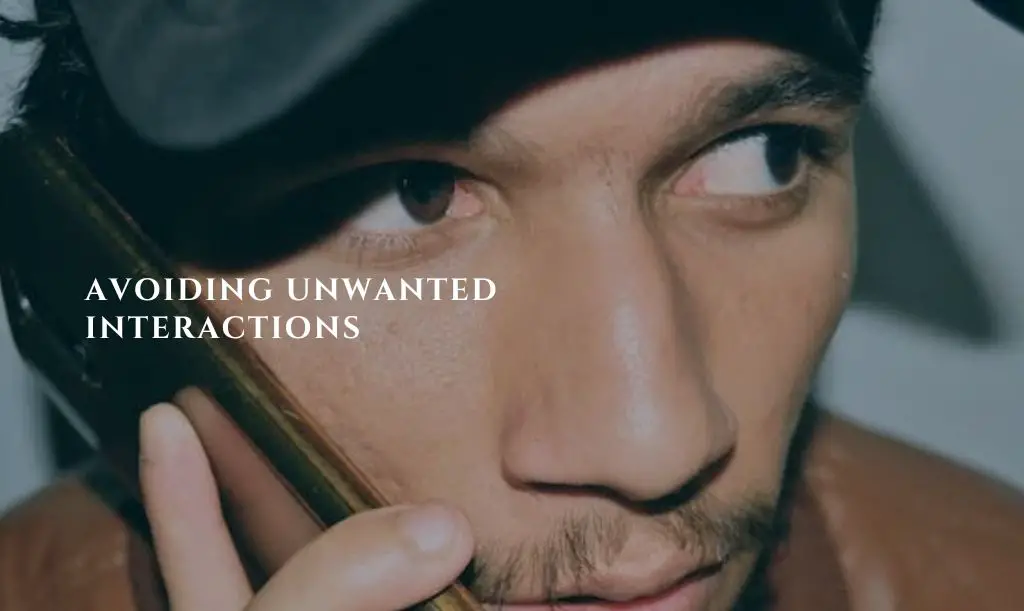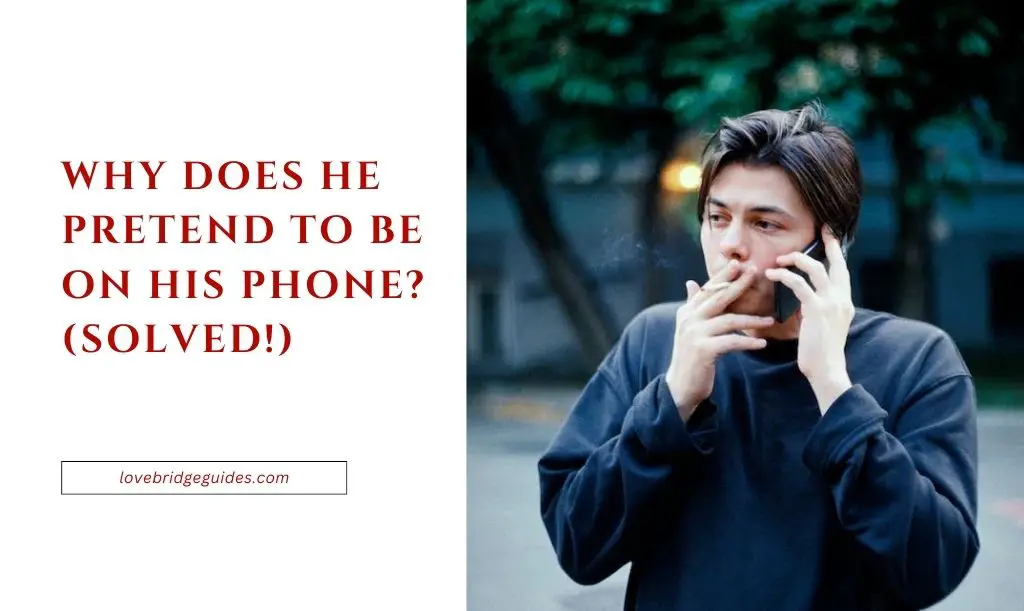‘Why does he pretend to be on his phone?
One plausible explanation for this peculiar behavior lies in the ever-growing trend of social disconnection.
We live in a world where face-to-face interactions are slowly being replaced by digital communication.
The rise of technology has brought with it a sense of detachment from those around us.
People find themselves immersed in virtual conversations rather than engaging with the physical presence beside them.
The fear of awkward social situations further fuels this tendency to pretend to be on a phone.
By avoiding eye contact and small talk, individuals can easily create a barrier between themselves and others.
But there is more to it than just social disconnection; the act of pretending to be on a phone is also a means of escaping reality.
In today’s fast-paced world, boredom and discomfort seem almost unbearable.
When confronted with mundane surroundings or uncomfortable environments, people turn to their phones as shields against these undesirable situations.
In the virtual realms offered by apps and websites, one can find solace and entertainment amidst an otherwise monotonous existence.
Additionally, projecting an image becomes crucial in our image-driven society.
Many individuals believe that constantly appearing busy or important signifies success and relevance.
The illusion of productivity created through constant phone activity allows people to impress others and maintain a certain level of status.
Being seen as connected and up-to-date with the latest trends is often seen as prestigious, leading individuals to perpetually pretend to be engrossed in their phones.
Whether it’s evading someone’s advances or simply not wanting to engage in conversation, this act provides an easy escape route.
Pretending to be occupied with a phone gives individuals the power to deter unwanted attention without causing offense.
It creates distance between oneself and others while allowing for necessary personal boundaries.
In essence, the phenomenon of pretending to be on a phone is not solely driven by one motive but rather encompasses various reasons that intertwine within our modern society.
While some may view this behavior as antisocial or disingenuous, it is essential to understand the underlying motivations behind it before passing judgment.
The complexities of human behavior cannot always be reduced to black-and-white judgments; sometimes we must delve deeper into the shades of gray that define our intricate existence.
Social Disconnection

While technology has undoubtedly brought numerous advancements and conveniences to our lives, it has also birthed a generation grappling with social disconnection.
Our dependence on gadgets knows no bounds, and as a result, our ability to engage in meaningful face-to-face interactions has been severely compromised.
In the yesteryears, conversations flourished over coffee shops and dinner tables.
People delighted in exchanging stories, ideas, and laughter without the constant interruption of glowing screens.
Yet now, as technology infiltrates every aspect of our existence, we find ourselves increasingly tethered to the virtual realm.
We have become slaves to notifications and likes – a sad reality that hampers genuine human connection.
Fear of Awkward Social Situations Leading to Phone Pretense
Why does he pretend to be on his phone even when there’s nothing particularly captivating happening on the screen?
It could be argued that one major reason is the fear of awkward social situations.
Small talk can be excruciatingly uncomfortable for some individuals who struggle with initiating or sustaining conversations.
When faced with unfamiliar faces or unfamiliar topics, we scuttle into the comforting embrace of our digital devices.
By feigning interest in our phone’s content – whether it be scrolling through social media feeds or texting imaginary friends – we shield ourselves from those dreaded moments of silence or potential embarrassment.
It becomes an armor against awkwardness; a silent plea for salvation from social discomfort.
Avoiding Eye Contact and Small Talk through Phone Distraction
Avoidance tactics are often employed when confronted with situations where eye contact and small talk are expected.
With heads buried in screens like ostriches sticking their heads in sand (albeit less adorable), we evade the need to establish connections with those around us.
Eye contact, once a means of conveying empathy and understanding, is now side-stepped and replaced with the glowing allure of a handheld device.
We’ve all witnessed it: people walking down bustling streets avoiding eye contact by pretending to be engrossed in messages that don’t exist or feverishly scrolling through news articles they’ve already read.
It’s as if these individuals have entered a protective bubble, isolating themselves from the world.
Creating a Barrier Between Oneself and Others
In this age of connectivity, paradoxically, we find ourselves building invisible walls between ourselves and those in our immediate vicinity.
The phone has become an impenetrable barrier – one that serves as both an excuse for isolation and a proclamation of disinterest in human connection.
By constantly pretending to be engaged with our phones, we create an unspoken message: “Do not disturb.”
We signal to others that our attention is not available for genuine interaction.
Escaping Reality

How many times have we found ourselves trapped in tedious situations, desperately seeking an exit strategy?
Enter the handy-dandy phone, our trusty companion in times of sheer monotony.
With a simple swipe and tap, we are transported into a world far more captivating than our immediate surroundings.
Whether we find ourselves stuck in a never-ending meeting or enduring an excruciatingly dull family gathering, our phones offer us a refuge from such uninspiring scenarios.
It’s almost cathartic to immerse oneself in the virtual realm rather than confront the mundane reality.
Finding Refuge From Social Anxiety Or Overwhelming Situations
Social anxiety can be crippling; it feels as if one is trapped within their own mind while drowning in unease at the prospect of human interaction.
Overwhelming situations only exacerbate these feelings of discomfort and panic. Thankfully, modern technology comes to our rescue once again!
With our phones firmly grasped in hand like a virtual safety blanket, we can avoid direct eye contact, stammering conversations, and the dreaded fear of saying something utterly foolish.
The allure of our screens allows us to retreat into a cocoon of safety, shielding us from the unpredictable nature of social interactions.
It becomes a sanctuary where we can control our environment and engage at our own pace, alleviating the overwhelming burden that real-life encounters may impose.
In essence, the phone has become more than just a means of communication; it has become an escape hatch from the realities we find less appealing.
Appearances and Image Management
In today’s fast-paced, image-driven society, appearances seem to hold more value than substance.
People are constantly seeking validation and recognition from their peers.
In this quest for social approval, the act of pretending to be engrossed in one’s phone becomes a powerful tool.
By appearing busy and preoccupied with important matters, individuals hope to convey an image of significance and relevance.
It is as if the incessant tapping on screens has become a modern-day status symbol – a badge that screams “I am not to be disturbed because I have important things going on.”
In a world where attention is scarce and time is limited, projecting busyness has become synonymous with success.
Creating An Illusion Of Productivity Through Constant Phone Activity
Have you ever noticed how some individuals seem to always be glued to their screens, typing away with fervor?
They give off the impression that they are tirelessly working or diligently accomplishing important tasks.
However, upon closer observation, one may discover that this perpetual busyness is nothing more than smoke and mirrors.
The constant phone activity serves as a clever façade – a way to mask procrastination or idleness.
By furiously scrolling through emails or pretending to engage in work-related conversations, people convince themselves and those around them that they are highly productive beings when in reality they may be merely caught up in mindless distractions or frivolous pursuits.
Avoiding Unwanted Interactions

There is an inherent power in appearing occupied.
By skillfully pretending to be engrossed in something deeply important on our phones, we send a clear message to others: “Do not disturb.”
Whether it’s scrolling through endless memes, reading an article about cat fashion shows, or simply staring blankly at the screen with feigned absorption, this artifice grants us permission to exist within our own bubble undisturbed.
Maintaining cordiality while simultaneously creating distance can be a delicate balance.
We certainly don’t want to offend anyone unnecessarily or appear rude.
However, there are times when personal boundaries must take precedence over social niceties.
Pretending to be on one’s phone offers an elegant solution – it allows us to create a subtle barrier without explicitly stating that we desire solitude.
It gives us control over our personal space and helps preserve our sanity amidst overwhelming social situations.
Why Does He Pretend To Be On His Phone? Conclusion
In a world filled with constant distractions and superficial connections, why does he pretend to be on his phone?
The reasons are multifaceted—a blend of social disconnection, escapism, image management, privacy protection, avoiding unwanted interactions—and yes—curiosity too!
While some may dismiss these behaviors as mere fakery or pretense, let us embrace a more compassionate perspective.
Perhaps behind those seemingly absorbed eyes lies genuine fascination for observing life unfold around us—an appreciation for the intricate tapestry woven by humanity.
Related Articles:
- https://lovebridgeguides.com/when-a-woman-calls-you-handsome/
- https://lovebridgeguides.com/what-do-good-morning-texts-mean-from-a-guy/
- Does A Prom Date Mean Anything? (Answered!) - 20 February 2024
- Boyfriend Refers To Me In Third Person (Explained!) - 20 February 2024
- Is Sending Memes Flirting? Find Out Here! - 20 February 2024

